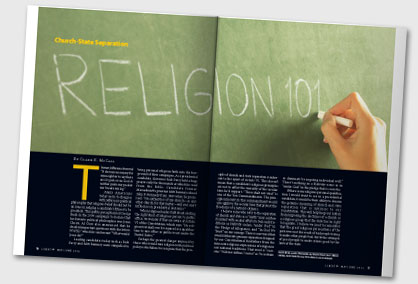Church-State Separation
Clark B. McCall May/June 2012
Thomas Jefferson observed: “It does me no injury for my neighbor to say there are 20 gods or no God. It neither picks my pocket nor breaks my leg.”
Many Americans today seem to disagree with Jefferson’s political philosophy that religious belief should not be an issue in judging a candidate’s fitness to be president. This public perception led George Bush in the 2000 campaign to declare that his favorite political philosopher was Jesus Christ. Al Gore also announced that he decided important questions with the letters WWJD,” which he said meant “What would Jesus do?”
Leading candidates today such as Rick Perry and Mitt Romney seem compelled to bring personal religious faith into the foreground of their campaigns. As a presidential candidate, Governor Rick Perry held a huge prayer rally for thousands at which he read from the Bible. Candidate former Massachusetts governor Mitt Romney echoed John F. Kennedy from 1960 when he promised: “No authorities of my church—or any other church, for that matter—will ever exert influence on presidential decisions.”
When religious leaders talk about electing the right kind of religious person to public office, we wonder if they are aware of Article VI of the Constitution, which says: “No religious test shall ever be required as a qualification to any office or public trust under the United States.”
Perhaps the greatest danger imposed by those who would mix religion with political policy is the failure to recognize that the principle of church and state separation is inherent to the spirit of Article VI. This doesn’t mean that a candidate’s religious principles are not to affect the morality of the secular laws he’d support. “Thou shalt not steal” is one of the Ten Commandments. The principle inherent in this commandment would also apply to the secular laws that protect the freedoms of a nation’s citizens.
I believe some who refer to the separation of church and state as a “myth” may confuse its intent with secular efforts to ban such traditions as Nativity scenes, “under God” in the Pledge of Allegiance, and “In God We Trust” on our coinage. There is one word that would delineate genuine separation designed by our Constitutional forefathers from the innocent religious expressions of religion in our national traditions. That word is “coercive.” Webster defines “coerce” as “to restrain or dominate by negating individual will.” There’s nothing in a Nativity scene or in “under God” in the pledge that is coercive.
If there is one religious personal qualification I would want to see in a presidential candidate, it would be their ability to discern the genuine meaning of church and state separation that is intrinsic to our Constitution. This will help keep our nation from imposing the doctrines of a church or a religious group that the state has no right to legislate. I believe we need to remember that the great religious persecutions of the past were not the result of bad people trying to make other people bad, but by the attempts of good people to make others good by the laws of the state.